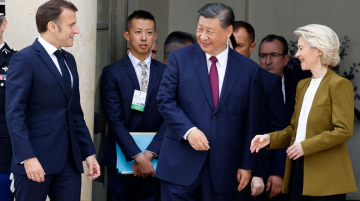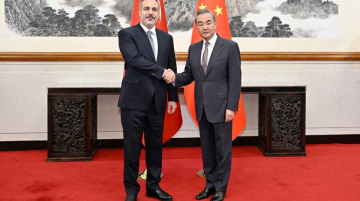
By Saniya Kulkarni
In the past two weeks alone, two island states have made shifts in their foreign policies to align more closely with China. The states in question are, of course, Nauru and the Maldives – the former used to be one of the few allies Taiwan has globally but decided to cut diplomatic ties and adhere to the ‘one-China’ principle, while the latter is currently engaged in a tense row with traditional ally, India.
The Maldives recently had a diplomatic spat involving India, originating from online outrage over comments made about Indian PM Modi by now-suspended Deputy Ministers in the Maldivian government. However, Male’s contentions with its much larger and more powerful neighbor are not new and have even become a major talking point in domestic electoral politics over the years.
The newly-elected President Mohamed Muizzu campaigned heavily on the platform of an ‘India Out’ movement spearheaded by his mentor and former President Abdulla Yameen, who was also responsible for the Maldives becoming part of China’s ‘Maritime Silk Road’ under its One Belt One Road (OBOR) initiative in 2017. Muizzu has just concluded a five-day trip to China to deepen ties with Beijing after straying from the tradition of India being the first foreign destination for Maldivian presidents.
The primary demand of the ‘India Out’ campaign in the Maldives is the exit of Indian troops stationed in the archipelago, albeit for non-military operations. The campaign also has broader goals of rejecting what it sees as New Delhi’s dominance over the Indian Ocean Region (IOR) – although the basis of these accusations remains somewhat unclear. While it is true that trade relations between the two are skewed in favor of India, the Maldives’ debt to China is around ten times what it owes to India ($1.37 billion and $123 million, respectively).
Muizzu’s ultimatum of March 15th for the exit of Indian troops is of significance to his party, the People’s National Congress (PNC), which recently lost the Male mayoral election to its opposition, the Maldivian Democratic Party (MDP), which has historically been openly critical of the Yameen-led government’s pivot away from India. The Maldivian Parliamentary elections on March 17, to a certain degree, hinge on Muizzu making good on his campaign promises.
While this partnership may seem insignificant from the Chinese perspective, considering the volume of investment already made towards Hambantota in Sri Lanka and Gwadar in Pakistan, the Maldives could still prove to be a crucial partner. The IOR is fairly stable, outside the remit of close US allies, and geo-strategically placed to keep a naval check on neighbor India. These factors render the IOR the perfect ground for China to test and expand its blue water ambitions, more so than the Pacific islands even, which are right in the heart of Quad territory.
The Maldives relationship turning sour would be less than ideal for India, which is already worried about Chinese naval networks “surrounding” the peninsula. It would need to take serious measures in strengthening its relationships with neighbours, reaffirming and renewing ties where necessary, in order to maintain its own maritime security. This need not be limited to neighbors and to the IOR but could also expand to the Pacific islands, many of whom it shares a British Raj-era relationship with, in the form of historic indentured labor that is now a robust diasporic community.
The Forum for India-Pacific Islands Cooperation (FIPIC) aims to serve as a platform for India’s engagement with the region but hasn’t so far been too visible in grander thinking around security. The recent row with the Maldives could perhaps shake things up if one were to take an optimistic view of India’s willingness to further deepen ties with island states and produce a naval network fit to counter China’s growing influence in its own neighborhood.
Saniya Kulkarni is a program manager at LSE IDEAS.










